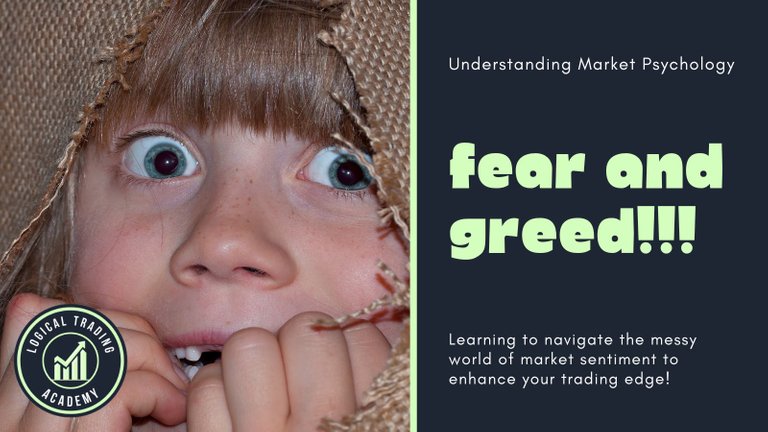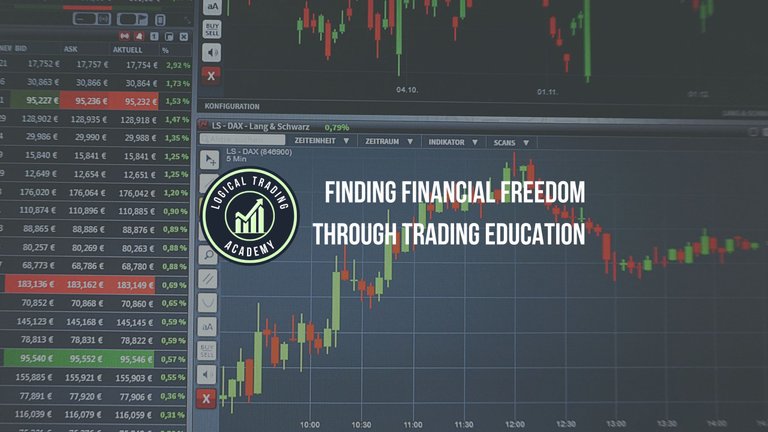
Hey there, fellow traders! Today, I want to share with you my personal journey into the ever changing world of market psychology. As I have been on a journey to become the best trader I can be, I have found that there is no technical or fundamental analysis more important than market sentiment and your own trading psychology.
Overall the market itself has a neutral bias. But as we know, humans run the market, and humans get emotional. Even though the market itself is just a series of auctions, it's the human players in the market that make it move, so knowing what the participants are feeling, including yourself, is a great way to try and gain edge and make some profits in the long run. So let's dive into it shall we?
Unveiling the Human Element
When I first started trading, I was solely focused on analyzing charts, studying economic indicators, and deciphering complex market patterns because that is what I was told I was supposed to be doing. However, I soon realized after blowing up a couple of trading accounts that there was something missing from my trading strategy: understanding human behavior. Market psychology, I discovered, holds the key to unraveling the ever puzzling world of market trends and patterns. The feelings of fear and greed in the markets are very real and measurable, so knowing this, you can master your own psyche and go out there and scalp those profits!
The Power of Fear
Fear, oh fear! It's a force that can make or break your trading decisions, or really any life decision for that matter, but we won't go down those rabbit holes, we are here to talk about trading the markets. I vividly remember the first time I experienced fear in the markets. The panic was palpable as prices plummeted, and my initial instinct was to sell everything, which I did a realized a bunch of losses over time. But through some hard trials and tribulations, and giving the market a bunch of money, I realized that it had nothing to do with the technical strategy I was using, it was all between the ears.
To navigate fear effectively, I learned the importance of keeping a level head and remaining calm during market turbulence. I mean fear is one of the first emotions you ever feel, so it is built into the human psyche. That's why we have a natural fight or flight response. But instead of worrying about saber tooth tigers eating us, we are now fearful of losing our money to the market sharks and whales.
Emotions can cloud judgment, leading to impulsive choices that we later regret. By reminding myself of the historical resilience of markets, I found the courage to resist the urge to sell in panic. This allowed me to stay the course and even seize new opportunities in the middle of the chaos.
The Temptation of Greed
Ah, greed, the ever-present temptation in the world of trading. It whispers promises of endless riches and blinds us to the risks lurking beneath the surface. I confess, I have fallen prey to its allure in the past. The excitement of a rising market can be intoxicating, making us overlook warning signs and disregard prudent risk management.
However, I soon realized that unchecked greed is a recipe for disaster. The markets do not go up forever and will turn against your bias, so you have to be ready and clear headed when those shifts happen, or you will let greed take everything you have.
It's essential to set realistic goals and adhere to a well-defined investment strategy or trading plan. By resisting the urge to chase quick gains and instead focusing on long-term sustainability, I was able to maintain a more balanced approach and protect myself from unnecessary losses. It is still a constant battle. This is why I do not doom scroll on social media while I am working in the markets. I get a quick idea of what the players are feeling from Twitter, check the news, and then turn it all off and hit the charts, because the rest will come out in the price action!
Analyzing Market Trends and Patterns
One of the most fascinating aspects of market psychology is how human emotions shape market trends and patterns. It's like unraveling a puzzle where each piece represents the collective actions of traders influenced by fear and greed. As I began analyzing these patterns, I discovered a whole new level of understanding the markets.
Support and resistance levels, for example, emerged as a result of market psychology. These levels provided valuable insights into potential entry and exit points for my trades. By studying historical market trends and observing how fear and greed have influenced past movements, I gained a broader perspective on the potential future impact of these emotions. Not to mention that supply and demand are just basic economic principals that somehow, many market participants just completely forget about. So keeping a cool head is the key to making consistent profits.
Conclusion
My journey into understanding market psychology has been transformative. It has added a whole new dimension to my trading strategy, helping me navigate the intricate web of fear and greed. By delving into the realm of human behavior, I've gained valuable insights into market trends and patterns.
So, as you embark on your trading adventures, remember that trading is not just about numbers and charts. It's about deciphering the emotions and behaviors that drive those numbers. By mastering market psychology, you unlock the potential to become a more successful and resilient trader.
Wishing you all profitable insights and rewarding experiences on your trading journey. Happy trading, my friends!
Wanna get on a path to financial freedom?
Join the Logical Trading Academy!
https://logicaltrading.academy
Trading Education | Trade Community | Trade Alerts | Market Analysis
Disclaimer: The information in this trade journal is for educational purposes only and should not be considered financial advice. Please consult with a qualified financial advisor before making any investment decisions.

Quite an interesting article. Thanks!